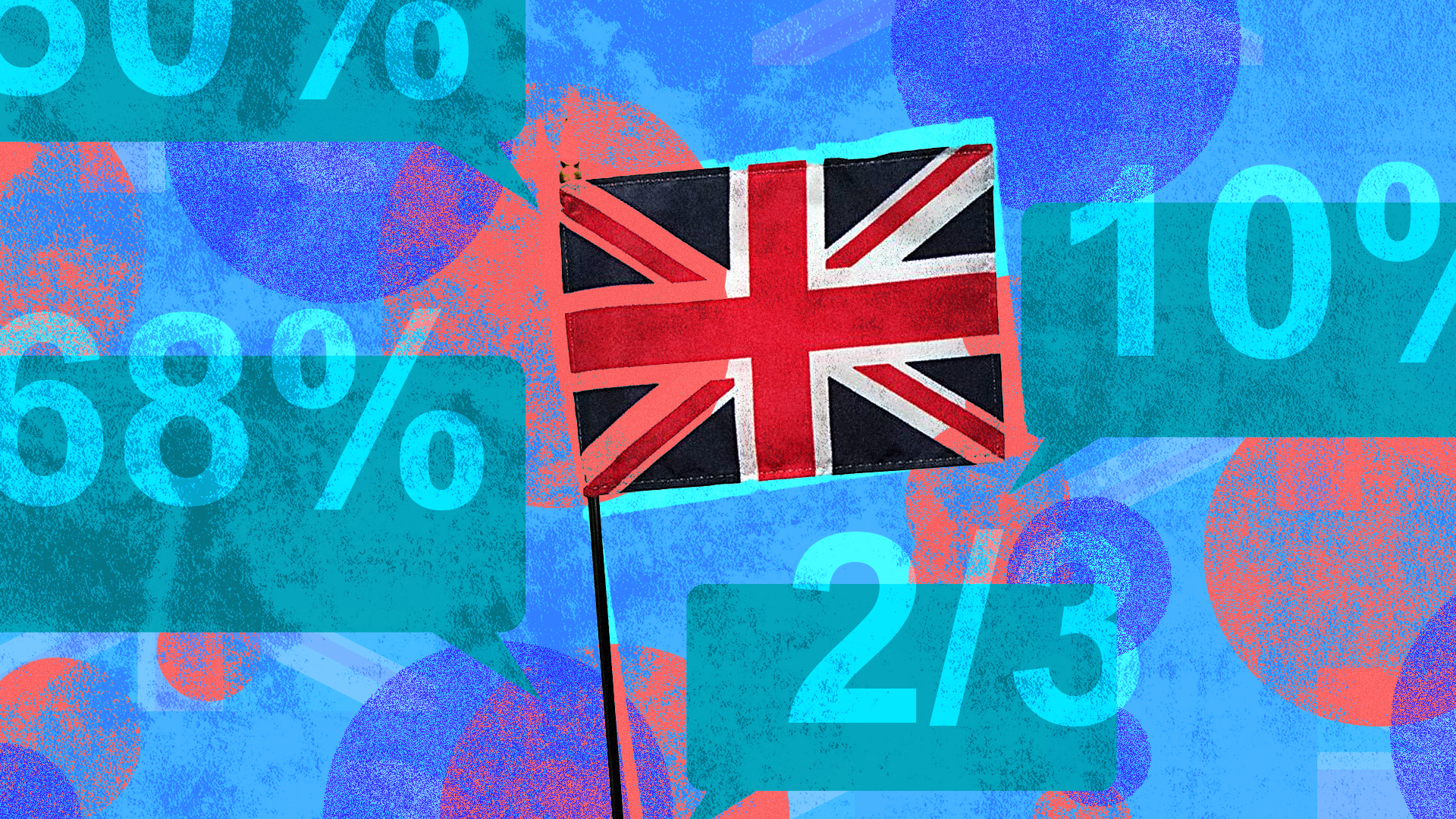New research by The Times has found that Gen Z has remarkably different opinions on the UK than Millennials did twenty years ago. What’s causing the change and why?
If you live in the UK, what are the first words that come to mind when I ask you to describe our island? Grey, monotonous, dreary…any of that feel familiar? While I can probably bank on most people agreeing on those adjectives, there are also a plethora of other societal issues that the UK population can be extremely divided on.
New research by The Times has sought to outline specific Gen Z attitudes and opinions toward modern Britain, including everything from racial tensions to marriage equality, vaping and even one-night stands. The findings are perhaps surprising to those unfamiliar with generational trends and are radically different to those surveyed twenty years ago.
For a start, pride in Britain has fallen dramatically. According to the study, patriotism with young people has dropped by 50% since 2004, and Gen Zers said they did not trust the nation’s institutions including the police and the NHS. In fact, 48% of young people said they thought the UK was racist compared to 36% who disagreed.
In addition, only 11% said they would fight for Britain and 41% said there were no circumstances in which they would take up arms for their country. 50% stated that they believed the UK was stuck in the past, and 21% said they didn’t drink alcohol. 60% have never tried a cigarette or vaped, but 64% supported decriminalising cannabis.
Okay, I realise I’ve thrown a ton of numbers at you. But what does this all mean? In recent weeks, we’ve written about the studies that show Gen Z’s waning belief in democracy and the societal factors that have pushed them into a political corner. With everything being more competitive, expensive, regulated and divisive, it’s clear that young people feel disillusioned with the democratic structures that promise them change and continually let them down.
This jaded attitude has seeped into Gen Z’s national feelings of patriotism too, if this new research by The Times is to be believed. Young people were coming of age and moving into their formative years when Brexit first rocked the boat in 2016. Since then, they’ve almost exclusively been living under Tory rule, forced to watch one government blunder after another.
Boris Johnson’s delayed response to Covid, Liz Truss being outlived by a lettuce, the lockdown party scandals, Rishi Sunak unable to use a contactless debit card like a normal human being. The list is endless. All of this political nonsense also coincides with rising university costs, housing, a squeezed job market and a sense of decline in living quality. Young people are clearly no longer as proud of the UK because there is less to be proud of, frankly.
The UK’s political parties often make little to no effort to appeal to young people, either. As older folks still make up the majority of the voter turnout, every major political group does its best to pander to this audience. It’s partly why Reform are surging, why Nigel Farage is actually an MP now, and why the results of this survey indicate that the majority of Gen Z believe the UK is ‘stuck in the past.’ Probably because by and large, it is.
It’s far harder for young people to feel like they can take risks today compared to their millennial peers of the early noughties. Thanks to social media and a hyper-competitive job market, it is daunting to take any time off in any capacity. Many young people are flung straight into university from school and then out into the job market with a mountain of debt three years later. Every move you make is plastered on LinkedIn and a sizeable gap of any kind has to be explainable.
Constantly keeping tabs on our lives in this way has ripple affects on our behaviours. Young people are seemingly less interested in alcohol than their parents were and are having less sex, for example, according to this new study.
While I can’t definitively tell you the answer as to why, I do know that Gen Z are struggling with their mental health and are far more self-aware at a young age compared to the youth of twenty years ago. Comedowns, hangovers and meaningless sexual encounters are far less appealing when you’ve deadlines, jobs, and your wellbeing to keep in check. It’s all about balance, a lesson that Gen Z are supposedly taking onboard far earlier in life than previous generations.
In the past few weeks, I’ve seen countless articles from middle-aged, middle-class people shunning all of this new data and trying to tell Gen Z that they’re wrong for feeling the way they do. Even David Mitchell couldn’t resist a jibe, mocking the attention spans of young people instead of considering that they may not have had anywhere near the level of economic prosperity of opportunity as he did thirty years ago.
It’s this disconnect from the reality of being young in 2025 that alienates older people. They can’t seem to understand why Gen Z are no longer patriotic for the UK, despite fifteen years of Tory cuts that have marginalised most outlets for young people. The arts, music, creative spaces and community activities have all been shrunk down considerably in the last decade. Our national outlook is defensive, racially-charged and very obviously flawed.
Which elements of this dysfunctional system are we supposed to be proud of? Gen Z’s outlook on the UK will be a surprise to those who are uninformed or out of the loop, but for those who are grappling with student debt and watching our political leaders continually ignore the concerns of young people, it all makes total sense.
🌏 Gen Z around the Web
the latest stories in youth culture and changing trends . . .
Gen Z has killed the one-night stand, research says (dazed)
New studies suggest that Gen Z are less interested in sex than older generations, a trend that has been reported regularly over the last few years. The latest by The Times indicates that only one quarter of young people report having one-night stands compared to over 75% of Millennials twenty years ago. They’re also apparently having safer sex, so it’s not all doom and gloom. It seems that Gen Z are also more progressive about trans rights. Given the current climate, we’d say that’s undoubtedly a good thing moving forward. Read more
Is speed dating the new Tinder for Gen Z? (bbc)
Everyone hates dating apps. They may have had their heyday ten years ago, but in 2025, they’re often full of bots, skewed to get customers to cough up more cash, or just feel like a whole waste of effort with little results. Now it seems some people are turning back to the more traditional ways of seeking a partner, through in-person events that encourage quick socialising and chats. Gen Z are finding it particularly appealing as it cuts out the pesky middle man and provides a different night out compared to most others. See you there? Read more
How happy are Gen Z adults? The answer is brutal (the times)
Here’s another unsurprising headline. Gen Z are unhappy and feel they’re worse off than their parents were at the same age. New research suggests that a third of young people have sought medical help for depression and other mental health issues in the past three years. The same number of respondents also say that Covid had longstanding negative effects on their mental wellbeing that still persist today. The study also shows that more young people are in debt, thanks to ongoing student loans and a surge in the cost of living that hasn’t been matched by increasing wages. It’s tough. Read more
Is Gen Z really addicted to doomscrolling? (the bbc)
Social media these days is all about short-form content and bitesize video. Our feeds on Instagram, TikTok and even YouTube encourage us to mindlessly scroll through mountains of endless content, often leaving us feeling worse off about ourselves and the state of the world. We all regularly hear that Gen Z are addicted to their phones, but how true is this really? Hannah Walsh from the BBC chatted to several people under 30 to learn about their habits and how it affects their mental health – with some surprising results. Read more
Coach’s Stuart Vevers puts Gen Z on the catwalk at New York fashion week (the guardian)
How do fashion designers speak to Gen Z? As an emerging global spender, it’s an important market to listen to if artists and creators want to maintain relevancy. Designer Stuart Vevers spoke to The Guardian about this year’s Coach catwalk. He talks about self-expression, 90s references and explains the runaway success of his recent work with young people. Coach is an emerging brand that has seen a 332% growth in year-on-year demand. Stuart must be doing something right – and Gen Zers are the ones handing over cash. Read more
![]()
That’s all for this week! Make sure to subscribe for the latest on Gen Z and youth culture, and check out The Common Thred for a weekly roundup of the latest news, trends and thought pieces.

















